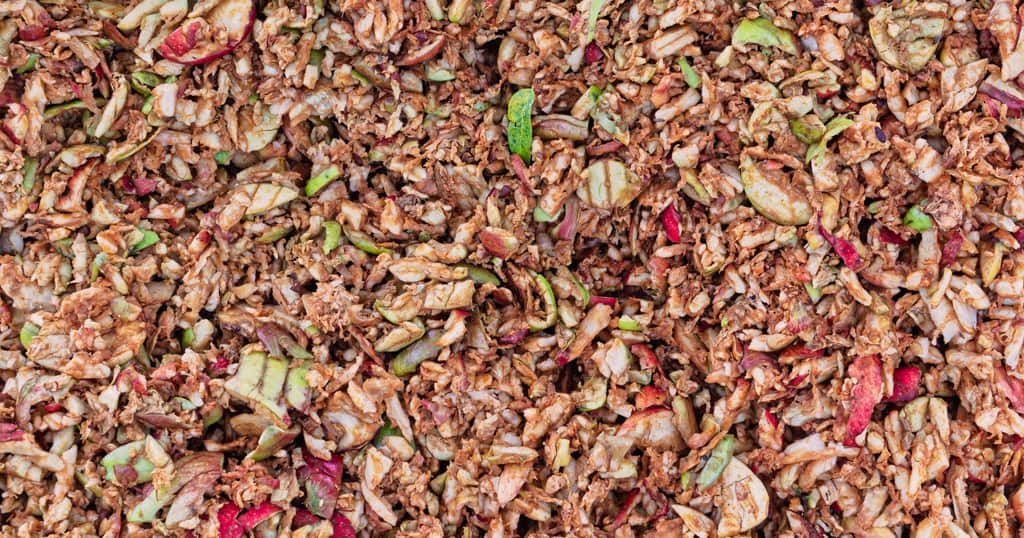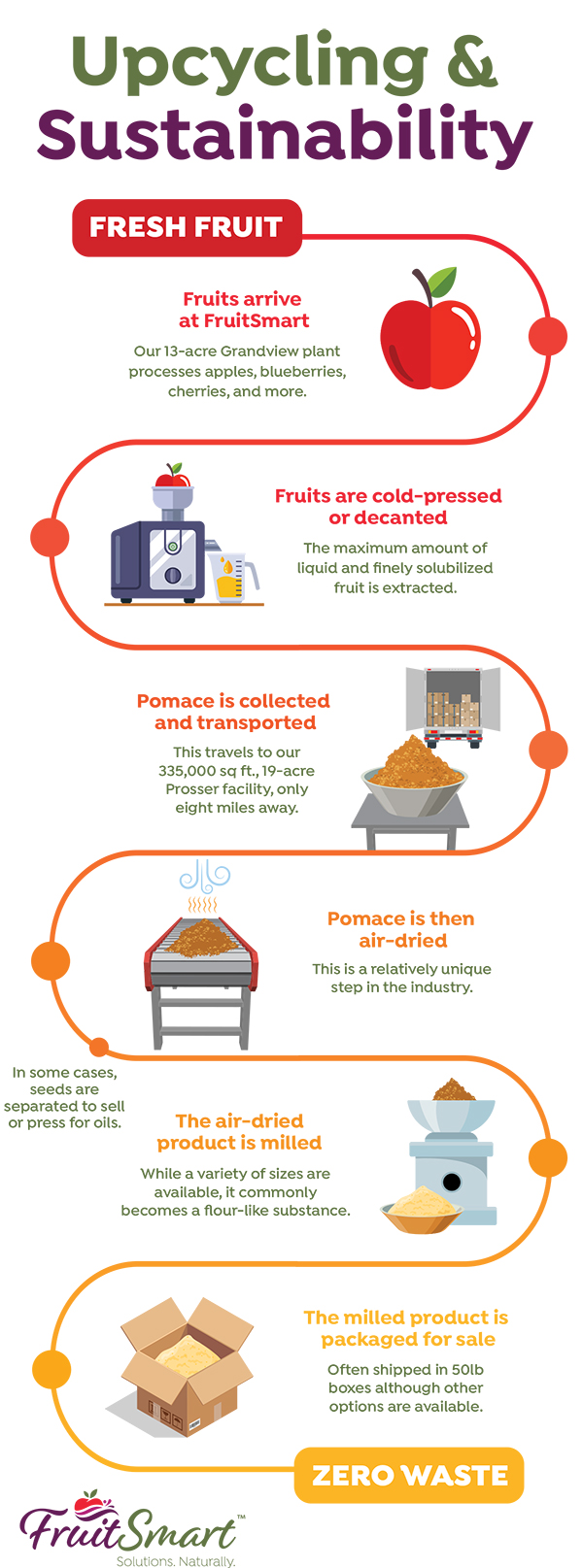
Recycling is a concept most of us now take for granted. The notion that some of the food packaging you once threw away could be reused or turned into new products is now common knowledge. What you might be surprised to learn is that many of the parts of the food you eat were once discarded, but are now being repurposed through a process called upcycling.
Fruit purees have long been used in food items such as granola bars, but now grains, veggies, and even nuts like cashews are being upcycled as startups and established companies alike find new ways to source and use ingredients that were once destined for the trash.
The list of foods that can be turned into upcycled food products is expanding all the time. Recovering spent grains that would once have been turned into animal feed or passed along into landfills is one area of significant growth in upcycling. At FruitSmart we take the pomace that is generated from our juice operation, dry, mill it, and make it into a sustainable, delicious, healthy ingredient. Apples, berries, concord grapes are only few of the upcycled ingredients we offer.
Processing whole food ingredients for juices and extracts leaves the pulp, seeds, and peels that can be repurposed for other food items. Many different foods including pecan shells and soybeans can be milled down into flours. Dried peels from vegetables can find their way into soups, and powders from many different fruits and vegetables can be added to everything from snack bars to beverages.
One element of upcycling that may cause some hesitation at first is where these ingredients are coming from. Upcycled ingredients are created from the same fruits, veggies, and grains that are used to make fruit juices, bread, and other high quality foods. The difference is that the upcycled portion of the food was previously considered a waste product. Now that manufacturing and distribution networks, as well as processing techniques, have provided ways to repurpose the pulp, seeds, or peels of many different kinds of food, the market is growing to find new applications for these upcycled ingredients.

As climate change continues to affect growing seasons and crop yields around the world, making the most of the food we produce as a planet is of greater and greater importance. Across the food industry, more and more people are becoming aware of the dangers of food loss and food insecurity. This means pressure continues to mount to make the best possible use of what we grow.
The amount of greenhouse gas emissions created through farming, harvesting, and supply chains all contribute to the sustainability of our food products. By reclaiming what were previously byproducts that ended up in landfills, upcycled ingredients can help lower the carbon footprint of the entire food system.
This is not just about reducing waste, though. There is nutritional value in the fruit solids that have traditionally been thrown away, and reclaiming those nutrients can improve all kinds of products. Far from being the leftovers, upcycled products are high quality ingredients ready for human consumption that were once relegated to animal feed or simply thrown away.
Finally, upcycling is important as a way to begin changing consumer sentiment and attitudes about the food we eat. 1.3 billion tons of food wasted every year globally, much of it simply for aesthetic reasons. Teaching consumers to understand the value and use of imperfect or otherwise discarded produce is an important step in reducing that waste. Upcycled produce has a part in this education by exposing people to the great taste and nutrition found in parts of our food we might have previously thrown away.
As food insecurity continues to rise across the globe, pressures continue to mount on all corners of the industry to take surplus food products out of the waste stream and find ways to convert it into products that can find their way onto grocery store shelves.
Finding connections between businesses is often the link where one industry’s waste can power the creation of another product. Beer brewing is a great example of how these links can spread in several directions. Bakeries usually have no shortage of extra bread that is not sold. Rather than letting it enter the waste stream, breweries can use this bread as a substrate for fermentation. This isn’t the end of the story either. Spent grain from the brewing process has been further converted by at least one company into snack chips.
At FruitSmart, we take the problem of food waste seriously. That is why we work hard to ensure we generate zero food waste from our Prosser facility. Fruit solids, called pomace, left after fruits like the Concord grapes and raspberries are pressed, are air-dried and then milled into various sizes to suit a wide range of uses. During this process any seeds are removed to be pressed separately for the oils they contain.
Since day one, FruitSmart has been at the forefront of innovation in providing our partners with the solutions they need to get the best possible products into retailers’ and customers’ hands. Our global network of growers means FruitSmart begins with the best possible ingredients, and our industry-leading processing techniques allow us to use every part of the ingredients from the delectable juices to the nutritious rind. FruitSmart was also one of the brands that participated in the UFA’s Upcycled Certification pilot program in 2021 and has now been awarded the organization’s certification mark, which highlights upcycled ingredients.
The sustainable food movement is only going to grow as time passes. Once the realm of nonprofits, startups have been bringing profitability to a food trend that is set to become more and more important. If you are ready to see how upcycled food could be helping the planet, your product line, and your bottom line, contact us today to learn more.
